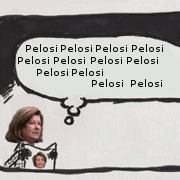|
Salesforce is basically just the WordPress of corporate CRM poo poo. It's so ubiquitous that it's not going away soon or quickly. You can probably make some decent money doing it, but it's going to brand you as a that thing doer.
|
|
|
|

|
| # ? May 15, 2024 03:04 |
|
Thank you for those answers to my Salesforce questions, very interesting.
|
|
|
|
All the Salesforce calls I've been on have been like Vendor: SALESFORCE IS GREAT! WE'LL SHOW YOU! me: ok show me Vendor: obviously this is not a custom solution but let's show you dummy site and dummy data and WOW LOOK AT THOSE CLICK RATES me: we're on a locked-down intranet and don't rely on SEO Vendor: trust me it'll be GREAT! I have yet to see any benefits of it to my role, and we have not purchased it. My boss asked me to look into it again. Not excited about another series of vendor meetings where they show me an example of what they did for a tech start-up. It seems like just another solution in search of a problem, but that might just be my workspace. The vendors don't have any idea of what it's like to work for the government.
|
|
|
|
So I'm an engineering supervisor with six direct reports at a medium-sized vehicle manufacturer. Think RV, but not RV. I'm 40, been here ten years, make low six-figures. They're going through a department restructuring, and for career advancement I have two options: go for more of an engineering management role, or go for more of a technical leadership role (which would be less administrative and more engineering. The latter is new for the company. It sounds like something I'd be more interested in (I enjoy the analysis and calculations that I do), but I've also been told I'm a good boss by my reports. They appreciate my leadership style. I think I could enjoy management as well, and it's more likely to get me to get past my own comfort zone. Does anybody have any experience with having to make this decision? They say, monetarily they're equitable but I imagine the "engineering manager" position would pay more as well as look better on the resume.
|
|
|
|
CornHolio posted:So I'm an engineering supervisor with six direct reports at a medium-sized vehicle manufacturer. Think RV, but not RV. I'm 40, been here ten years, make low six-figures. What’s the additional responsibilities of engineering manager? You’d have supervisors under you? I guess my assumption is that with six direct reports you have a pretty good idea of what management is like and being a senior manager is just more of that. From what I’ve seen in Engineering, the Tech Leads that climb the parallel ladder to Engineering Management are people who very clearly do not want to be encumbered with dealing with the HR overhead and responsibilities that come with being a Manager. If you don’t feel strongly either way at this point in time, then it might be worth doing a work back from like 62 y/o and searching around how comfortable you’d be trying new things vs. getting to a particular goal. From a monetary perspective, I’d assume there are more promo opportunities in the Managers path than the tech lead path, so it may be more a game of future opportunities as opposed to compensation.
|
|
|
|
CornHolio posted:So I'm an engineering supervisor with six direct reports at a medium-sized vehicle manufacturer. Think RV, but not RV. I'm 40, been here ten years, make low six-figures. They're the same level. Pay is almost certainly the same; where it's different I'm used to IC track getting more at staff/manager level and manager getting more a few levels up at director+. Manager role will look better going forward as a manager. IC will look better going forward as an IC. That said, you won't be locked in to either track either way. I'm a little younger than you but picked up a management role a year ago. I've been enjoying it, but it's a very different thing and a different structure to my day. I've had a lot more energy for personal projects than I did when I was an IC.
|
|
|
|
I'm in software so it's not exactly the same, but I tried management for about a year and a half before bailing back to the IC track. I was still doing engineering work as a front-line manager so it was easy for me to transition back (at a different company, with a giant raise). If you stay in management a long time and get further and further from the engineering it could be more difficult to switch back.Crazyweasel posted:From what I’ve seen in Engineering, the Tech Leads that climb the parallel ladder to Engineering Management are people who very clearly do not want to be encumbered with dealing with the HR overhead and responsibilities that come with being a Manager. Hi it's me My work stays technical but has some management-like skills like leading projects & teams, delegating work, making/influencing technical priorities and staffing, mentoring and developing juniors, etc. but I don't have to deal with the "people problems" of real management. For real ladder climbers I think there is a reasonably strong argument that management has a higher ceiling of career prestige, but staff+ ICs get paid plenty well for a different lifestyle. Guinness fucked around with this message at 22:28 on Nov 16, 2022 |
|
|
|
Guinness posted:For real ladder climbers I think there is a reasonably strong argument that management has a higher ceiling of career prestige, but staff+ ICs get paid plenty well for a different lifestyle. Reminds me of a time back in Defense during a Phase Gate review - The Sr. Fellow making $280k cash a year sitting at the head of the table, happy as a a clam, doing some long division and other math on a scratch pad while management talked for 25 minutes about headcount. Painted a pretty clear picture to me.
|
|
|
|
I made this decision 6 years ago. Go technical IC or move into management. I went with management and mostly don't regret it. I am still involved in technical stuff but do zero design or reviews. More high level planning and decision making these days. It was a tough decision at the time but ultimately the right one for me. Pay wise i think it will depend a lot on the company. A guy who works for me with the same experience but IC role (my best engineer) makes about $20k less than me and i have a 3% higher bonus Target. When he gets to the highest level (one more to go) we will have similar pay with me most likely making $5-10k more plus the bonus difference. It is definitely a different role, expect to complete the rare engineering task. You also have to deal with personnel and the issues that brings. I can't say what you should do but if you stay IC you will probably be in that role long term unless you change companies.
|
|
|
|
What’s the thought about professional certificates for career changers? I have a bachelors degree in engineering but i graduated into the financial crisis and I never really used it. I’ve been a stay at home dad since and now that my kids are older I’m looking to go back to work. The great algorithm is feeding me a bunch of ads for professional certificates in things that actually interest me, they’re from reputable sources, but they’re expensive. Seems like a good deal if I could get an employer to pay for it but alas. Would the name of the institution (Berkeley, MIT, etc) be worth the price of admission or are they fishing for rich foreign students? There’s always an actual MS program at the local state school
|
|
|
|
Looking for advice, encouragement, etc. I am a contract food service general manager making about $103k a year, hating this industry after over a decade climbing the ladder, ready to move on. I want to work in the climate change field (reducing it not encouraging it). Government, NPO or private sector are all fine. I have transferrable skills developed in this industry but no certificates or degrees specifically in ecology, environmental science, etc. I finished a Master's of Public Admin recently to help with the career transition but am kinda lost. I have a BA in English/creative writing. Interested in research, policy writing, grant writing, solar policy initiatives, anything that gets me outside as well. I am open to almost anything. I was hoping to get more out of my MPA program including some connections (and was hoping for the civillian climate corps legislation to pass...) which never manifested. Open to remote and/or some travel. My current job is fairly stable but dependent upon my client's decisions, easy enough, M-F no travel. I can take about a $35k/year pay cut if there's opportunity to increase over time, partially dependent upon what happens with my wife's career in the next 4-6 months (potential job switch, pay raise, move incoming).
|
|
|
|
Proust Malone posted:What’s the thought about professional certificates for career changers? I have a bachelors degree in engineering but i graduated into the financial crisis and I never really used it. I’ve been a stay at home dad since and now that my kids are older I’m looking to go back to work. The state school program is probably your best bet. Some of those certificates aren't bad but some are and it's hard to sort out which are which. skylined! posted:Looking for advice, encouragement, etc. I am a contract food service general manager making about $103k a year, hating this industry after over a decade climbing the ladder, ready to move on. I want to work in the climate change field (reducing it not encouraging it). Government, NPO or private sector are all fine. I have transferrable skills developed in this industry but no certificates or degrees specifically in ecology, environmental science, etc. Talk to the career offices at the schools you've graduated from. They can help.
|
|
|
|
skylined! posted:Looking for advice, encouragement, etc. Maybe maybe look into public health nutrition? I know Berkley has a masters program for it; even though you’re not looking for an academic program maybe you could look through their handbook to see what research centers they work with, where their students get internships and jobs, etc. It overlaps a bit with your degree, your past career experience, and your goals. It’s not climate stuff but there’s plenty of government and government-adjacent jobs in the field; and once you’re in some big government or grant-driven organizations there would probably be some easy jumps to climate-focused policy. Don’t know how applicable this is to your situation, but a few keywords you mentioned made it seem like a good fit.
|
|
|
|
Hey goons, I hope this is the right place for this post. My brother has been doing digital campaign management, some public relations writing, and investor relations for a couple of years now after a lifetime of restaurant managerial roles. He is really dead-set on entering the world of sports/community engagement/sales/operations etc and from what he has gathered, the only real path for him without a formal education is to start in inside sales and work his way up. He has been making great connections with professional organizations and their PR teams and is getting ready to apply to some of them. Does anyone have valuable insight in terms of what an example of a good sales resume might look like with an untraditional background (even pointing to a template would be good)? Any tips on standing out in the sports sales world? Really appreciate any help!
|
|
|
|
skylined! posted:I want to work in the climate change field (reducing it not encouraging it). My partner works in corporate environmental sustainability which could be a good climate related option that pays well. I can ask her about routes in to the field, but I do know there is a lot of work in sustainability strategy and specifically sustainability reporting currently. Basically all companies are simultaneously deciding they need to do annual sustainability reports, and don't have the expertise in house. Yes this could mean working for bad-guy megacorps, but it is also a way to have a big impact.
|
|
|
|
knox_harrington posted:Yes this could mean working for bad-guy megacorps, but it is also a way to have a big impact. That's assuming they give one singular gently caress about the results, let alone implement your recommendations. That said, I would also be interested to hear if there are any no-degree paths into that industry. I work in marketing and am tired of feeling like I actively make the world worse
|
|
|
|
Looking for advice on a career transition into a data analyst / business intelligence position. Not sure where to start and looking for resources on what's required - I know on a technical level these jobs rely heavily on SQL and (maybe?) some knowledge of scripting languages (python). Any advice appreciated!
|
|
|
|
What do you do now?
|
|
|
|
ultrafilter posted:What do you do now? It's not for myself, asking for a friend - they're coming from a completely non technical position (office admin stuff).
|
|
|
|
There's a lot of space in there from hardcore data science adjacent work to more basic reporting, visualizations, dashboards etc. The latter is easier to enter in to especially without a formal background. Maybe some Excel, light SQL for data pulls/queries, and then PowerBI/Tableau/viz software du jour should do it especially at a smaller company. Salesforce stuff can be useful, too.
|
|
|
|
KYOON GRIFFEY JR posted:There's a lot of space in there from hardcore data science adjacent work to more basic reporting, visualizations, dashboards etc. The latter is easier to enter in to especially without a formal background. Maybe some Excel, light SQL for data pulls/queries, and then PowerBI/Tableau/viz software du jour should do it especially at a smaller company. Salesforce stuff can be useful, too. Thanks for this, it's always interesting to hear what fields have space in the margins for entry without a formal background, even if it is more basic work. How much long-term mobility is there if you get started that way?
|
|
|
|
KYOON GRIFFEY JR posted:PowerBI/Tableau/viz software du jour What's the advantage to these vs R/python etc? Just easier to learn, or is there functionality or compatibility stuff?
|
|
|
|
Epitope posted:What's the advantage to these vs R/python etc? Just easier to learn, or is there functionality or compatibility stuff? I assume they have a lot of quality of life and functionality stuff built in, rather than relying on artisanally hand crafting your data visualizations from scratch with matplotlib or whatever?
|
|
|
|
R and Python focus on data extraction, reformatting, cleanup. Tableau and PowerBI are more on displaying the data to a wider audience.
|
|
|
|
R and Python both have excellent graphics capabilities but the learning curve is steeper than Tableau or PowerBI.
|
|
|
|
a lot of big corps use PowerBI or Tableau as a standard visualization tool for reporting etc so they are looking for experience with those tools. there's also a lot of reporting done in those tools that users can interact with, which is harder to do in R/Python
|
|
|
|
I'm a project manager, 47, and after a decade in the same company, it looks like it's finally time for a change. I managed some in-house software projects and I'd like to continue this kind of work because I believe I was good at it (and IT pays better than most other industries). I used to manage a couple of developers, a graphics designer, some editors, etc. In getting ready to test the job market, I'm considering investing in learning programming or getting an Agile certification. I have a CS degree and billions of years ago they taught us Pascal, but I felt better in QBasic and wrote simple programs in it. I have some experience with agile too. A few years ago a colleague introduced us to scrum and we set up some sprints but it failed because the boss was/is a micromanager and we had to work on whatever he felt like that day. Anyway the methodology didn't appear difficult. So do I go from a PM who understands technical concepts but can't program to one who can program at a junior level? Or from a PM with practically no agile experience to one who is inexperienced but certified? Or something else entirely?
|
|
|
|
technotronic posted:I'm a project manager, 47, and after a decade in the same company, it looks like it's finally time for a change. I managed some in-house software projects and I'd like to continue this kind of work because I believe I was good at it (and IT pays better than most other industries). I used to manage a couple of developers, a graphics designer, some editors, etc. For agile you can start with ether PSM or CSM certification. PSM is cheaper and lasts a lifetime while CSM needs renewal and is more expensive. Both are legit, but CSM appears in more job postings. If you like it, then do PSM II or the follow up to CSM. Then you can learn JIRA and so some of the Atlassian certs/badges. JIRA is the most popular agile management tool. If you want to help entire organizations (in a higher level position) become more agile, then you could learn how to do agile at scale. There are couple methodologies, but Safe 5 is the most known and highest paid for. Safe certifications however are very expensive.
|
|
|
|
technotronic posted:So do I go from a PM who understands technical concepts but can't program to one who can program at a junior level? Or from a PM with practically no agile experience to one who is inexperienced but certified? Or something else entirely? The quicker path is becoming a scrum master or delivery manager. It's a combination of project manager, Agile coach, with requirements of being able to understand technical topics. Certifications will go a long way and you can kinda goose up the experience you do have. Becoming a junior developer is an option, but from what you've said you'll basically be starting at 0. You'd also have an uphill climb at 47 in terms of perceptions, this isn't a discouragement but just the lay of the land. Getting the first developer job is hard for anyone. You can also look at QA, which I feel is oft overlooked as a good career because the salary ceiling is lower than development, but still higher than most other industries. Have you looked at doing more technical, IT Project Management? That seems like it'd be the closest fit. I've had to suffer through many IT project managers who didn't see as qualified as you are for various technical projects and they make bank too. I suspect the problem might be just where you've been sitting for that long vs the PM role....
|
|
|
|
Meshka posted:For agile you can start with ether PSM or CSM certification. PSM is cheaper and lasts a lifetime while CSM needs renewal and is more expensive. Both are legit, but CSM appears in more job postings. If you like it, then do PSM II or the follow up to CSM. Then you can learn JIRA and so some of the Atlassian certs/badges. JIRA is the most popular agile management tool. Thanks, I'll look into PSM. Lockback posted:The quicker path is becoming a scrum master or delivery manager. It's a combination of project manager, Agile coach, with requirements of being able to understand technical topics. Certifications will go a long way and you can kinda goose up the experience you do have. Well yes, that's what I was describing (poorly, I guess) -- IT Project Management. I didn't mean to switch to a developer career, I was talking about learning to program to become a better IT PM. QA is a nice idea because I'm good at testing stuff. I just don't know if I can go above a QA tester. I can't become a QA engineer.
|
|
|
|
I started working full time recently and I feel like I'm struggling in an office environment. I have about 2-3 hours of work today and I spend the rest of the day trying to look productive. While it is ideal for a lot of people, I feel like it's really draining for me. Right now I would say my passion in life has been volunteering as a text crisis counselor. I've been volunteering 5-15 hours a week for the last couple of months on top of working full time. I've also have received a good amount positive feedback from my supervisor (Though I'm sure it's required for them to give it to volunteers for some extent) as well as the texters I work with. I think my experience with volunteering is making me question my future career path. But I'm worried that I'm going to get burnt out if I make it my full time job and have to work with people face-to-face. Does anyone have any perspective on this?
|
|
|
|
Lemon Trees posted:I started working full time recently and I feel like I'm struggling in an office environment. I have about 2-3 hours of work today and I spend the rest of the day trying to look productive. While it is ideal for a lot of people, I feel like it's really draining for me. I went through something similar over the last five years, though I can’t speak to specific lines of work for you. I went from food to an office. The pace is indeed glacial. The important things like speed and output changed to being easy to work with. Took some adjusting, but I used the improved pay and benefits to do therapy and work on myself, which I had zero time to do in food. The whole time I was real bored with so “little” to do. I used my “free” time to identify what specifically I didn’t like about the specific tasks I was assigned. I thought about what frustrated me and how I would prefer things and interactions to happen. I used that data to scout jobs that seemed to line up, talked with people I sort of knew on LinkedIn who had those jobs to confirm/ask for advice and then tried to get in those jobs. I’m working in something I like now and it is going pretty well. Posters here pushed me to figure out what I want. Took a couple years but I’m glad I did.
|
|
|
|
I get to do both, which is pretty great. Hustling butt at the bench I feel a lot more alive, but day after day it starts to wear you down. Sitting at a desk is a soul suck, but lets you recover and think about other things. Can you do part time office work, and part time crisis counselor? The hard part might be finding the part time positions, but maybe it's out there
|
|
|
|
Social work can offer a mix of field and desk work, but the degrees you need to do it can be expensive. It might be worth looking into.
|
|
|
|
Lemon Trees posted:I started working full time recently and I feel like I'm struggling in an office environment. I have about 2-3 hours of work today and I spend the rest of the day trying to look productive. While it is ideal for a lot of people, I feel like it's really draining for me. My previous job at a university had a great balance of sit-down admin work and running around campus doing events/facilities/student work. While uni work can have the same issue of "2-3 hours of work a day" at times, the opportunity to walk around campus and do a bunch of random odd tasks helped alleviate that. Departments like communications, student life, events, libraries, etc.. could be the more active jobs, so not stuff in procurement. I made the switch to a more sedentary office job for better pay and career growth options about 7-8 months ago, and I've been considering switching back to a university or looking for a job that has a more in-person active footprint. I've even thought about going back to school to become a teacher! which may or may not be a good idea. pizzapocketparty fucked around with this message at 21:46 on Jan 11, 2023 |
|
|
|
Not a direct answer but if you don't have enough work ask your boss for more work. Maybe you did already.
|
|
|
|
if you feel like you don't have enough to do and enough people making insane demands of your time there is always strategy / management consulting!!!!!
|
|
|
|
spwrozek posted:Not a direct answer but if you don't have enough work ask your boss for more work. Maybe you did already. I'll be honest, I'm not looking for more work. But I don't like not working either. Hm
|
|
|
|
I’m new to BFC, and I have a forum etiquette and culture question before I post my actual question. I need some guidance on essentially starting my career over, and going into something that will allow 100% remote work, so that I can be physically present for my elderly parents with deteriorating health. I see that would normally go in this thread. But my situation is… complicated, and the context really does matter, and all my attempts to make it concise so I can post it in BFC and not have people’s eyes glaze over have still ended up pretty lengthy. How would thread regulars suggest I approach this? Should I try to cut it down to a TL;DR and answer questions as they arise, or do people hereabouts prefer to have all the context up front? Or would an entirely separate “he;lp” thread be better?
|
|
|
|

|
| # ? May 15, 2024 03:04 |
|
Just post. Here is fine. If it's long it's long, people will either read it or not. But you'll probably get more traction here.
|
|
|


































